
The Internet's Premier Classical Music Source
Related Links
Recommended Links
Site News
Ludwig van Beethoven
Piano Sonatas: An Overview of Selected Recordings
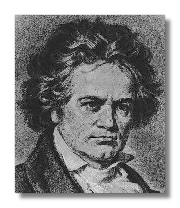
[ The following survey of Beethoven sonata recordings, written in 1996, was never intended to be comprehensive. It was meant as a survey of selected recordings. There were numerous famous recordings that I deliberately chose not to include, some because they were already known quantities and others because at the time I was not yet sufficiently familiar with them to comment. The recordings I did survey struck me then, and still strike me now, as being important and significant and worthy of your consideration. – Ron Drummond, 9/23/04 ]
Any complete recording of a cycle as diverse as Beethoven's is going to be uneven, period. You will not find a be-all end-all. Nevertheless, I do think it's useful to have a complete recording by one artist, for the insights a single, refined sensibility can bring to Beethoven across the full range of his sonatas. But one should also consider supplementing a complete recording with additional recordings of individual sonatas by various performers.
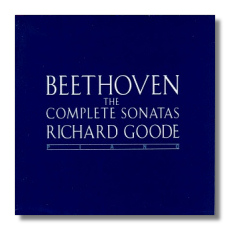
Of complete sets, I highly recommend Richard Goode on Elektra/Nonesuch. Goode has been praised in almost all quarters as perhaps the finest surveyor of Beethoven's sonatas since Schnabel. He has all the chops and a wealth of feeling and insight to convey. The recording is state of the art. Though superb throughout, Goode is at his best in Sonatas 12-18.
Another cycle which alas is not yet complete is Jean Bernard Pommier's on Erato. Three multi-disc volumes (of an eventual four) have been released so far, and I for one am eager to have that last volume! Where Goode takes a Romantic approach to Beethoven, Pommier achieves an almost ideally Classical equipoise. He is fleet, sensitive, flexible, and very expressive. The recorded sound is among the best I've heard in piano recordings. Pommier is at his best in the first ten sonatas (works which I have a particular fondness for), but the later works are wonderful as well.
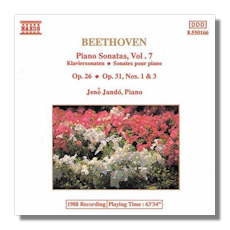
Jenő Jandó on Naxos is quite decent – if budgetary considerations are paramount, you won't go wrong getting his set. Like Pommier, Jando takes a classical approach, though at times he can be cold. While overall not as fine as either Goode or Pommier, Jandó need make no apologies, and he even occasionally beats the competition: his "Les adieux", for example, is better than Goode's, much warmer. Jandó may not be the last word in these works, but again, as I said above, there is no last word. (A nice bonus in this set is the inclusion of Beethoven's three earliest sonatas, published in 1783 when the composer was 12.)
A word about Artur Schnabel. He was the first pianist to record all 32 sonatas, back in the 1930s. To this day, his performances are considered by many to be definitive. They are the yardstick against which all new performances are measured. Certainly, for anyone whose love for these works becomes a passion, Schnabel must eventually be encountered and reckoned with. The problem for me and for many of you will be the recording quality: tinny, noisy, 1930s mono. I finally broke down and got Volume 1 of the complete sonatas on the Pearl label. (Multiple CD remasterings of Schnabel have been released on a variety of labels; the experts all agree that Pearl is the one to get.) Frankly, I'm glad I came to Schnabel only AFTER getting to know the sonatas through other performers. I have a good sense of the range of interpretive stances that are possible in Beethoven, and that sense of range helps me to hear Schnabel better, to discern what's unique to his vision of Beethoven's works. After just a taste, I can say that I look forward to getting to know these recordings. There's a rough-hewn quality to Schnabel's fast movements that is quite charming; his insights are sometimes startling. But he takes those fast movements very fast, and I miss many of the insights I've heard elsewhere. His slow movements, however, are ravishingly beautiful, limitlessly fecund. Is Schnabel the be-all end-all, as so many claim? Of course not. But he is one of the finest, a groundbreaker, a pathfinder. My recommendation, especially if you're just getting into the sonatas? Save Schnabel till later.
As for supplemental recordings …
Murray Perahia's new Sony recording of Beethoven's first three sonatas (Opus 2) was an instant favorite for me. I love Opus 2, and Perahia plays these works with loving devotion, with enormous wit and generosity of spirit. On first hearing, I kept gasping at his many small felicities of emphasis and expression. Yes!
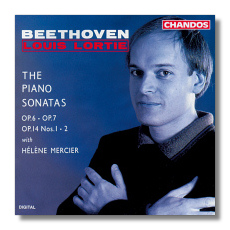
Another cherishable disc of early sonatas comes from Louis Lortie on Chandos. The Opus 7 sonata (Beethoven's longest prior to the Hammerklavier) had been largely opaque to me before I heard Lortie; he brings it home. Lortie is like a river: smooth, clear, unstoppable. The disc is coupled with ebullient readings of the two Opus 14 sonatas, and pianist Helene Mercier joins Lortie for the rare Sonata for Piano Four Hands, Opus 6, delightful fluff.
Ivan Moravec is one of the great Beethoven players. To those in the know, he is revered almost as highly as Schnabel. The audiophile label VAI has released 2CDs of Moravec's recordings from the 1960s, in demonstration-quality stereo sound. Volume 2 contains the most famous of Beethoven's sonatas – if you're looking for a first disc of these works, this is the one to have. And even if you already have several recordings of the standard warhorses, Moravec is essential.
For the late sonatas, get the Charles Rosen set of the last six on Sony Essential Classics. Recorded in the early 70s in excellent sound (right around the time Rosen's classic book The Classical Style was winning the National Book Award), these are deeply insightful readings, and the two-disc set sells for the price of one.
Lovers of the Hammerklavier Sonata should add Ursula Oppens' recording on Music & Arts to their collections. Do I really need to sing her praises? She is a pianist for the ages.
I love pianos from all periods in the instrument's relatively brief history. One thing many folks don't realize about "period" pianos is that every one sounds different – the design didn't become standardized until the 1870s. Before that, virtually every maker had their own design, their own variation on the relevant mechanisms. Many, if not most, fortepiano recordings are done on Anton Walter fortepianos, originals or copies – hence it's understandable that people make the mistake of thinking that because they've heard one fortepiano, they've heard them all. Not so. The sounds of some fortepianos take longer getting used to than others, but the variety of textures and sounds are fascinating to me, and hence a subtext of my collecting involves getting recordings of as many different makes of pianoforte as I can. This is a secondary consideration, coming after repertoire and performer in my considerations, but still something I'm very aware of when I buy Classical Era CDs.
I do believe that it is essential to hear Beethoven performed on fortepianos. Not the be-all end-all, mind you – but an absolutely essential supplement for anyone wishing open-mindedly to plumb the depths of these works in all the many ways they can afford. But again, I am one who believes that no single performance can exhaust the riches of any one of these masterpieces, and many fine performances can inter-illuminate one another in ways that are richly rewarding.
Of the current crop of Beethoven Sonatas on fortepiano, these thoughts:
Avoid Melvyn Tan. His popularity confounds me. I find his playing to be stiff, awkward, and unimaginative to a fault.
I wish Elektra/Nonesuch would release Malcolm Bilson's early-80s recordings of Beethoven sonatas on CD. I heard Bilson play live a few months ago, and his performance of the d minor sonata is the best I've yet heard, even with a few flubbed notes. It seemed he had absorbed the music into his deepest being, merged himself with it, and when he played it, the notes sang out from him – I swear, he played as though he'd humbly offered up his spirit to the spirit of the work, to the spirit of Beethoven, and the two joined and the music poured out, a single soul in sound. It made me want to cry.
I have mixed feelings about Paul Badura-Skoda's cycle on Astree – a sign in its favor, actually. Worth a listen.
Alexei Lubimov on Erato has released an excellent disc of Beethoven's sonata warhorses (Pathétique, Moonlight, Waldstein).
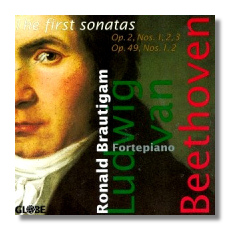
The best fortepiano recordings of Beethoven that I've heard are all on the Globe label, a superb record label based in Utrecht:
Ronald Brautigam has recorded 2CDs: early piano variations, and the first piano sonatas (opera 2 & 49). He plays a 1790s Walter. Full of life and sparkle, but searching where called for (the slow movements of Opus 2 positively sing).
The biggest find here, however, is Paul Komen. He's recorded three discs of Beethoven sonatas for Globe, a disc of the three Opus 31 sonatas, a disc of Opera 53, 54 & 57, and a disc of the last three sonatas, Opera 109-111. He uses a different fortepiano on each recording, and in each case one that is roughly contemporary with the dates of composition of the works in question. The man's amazing. I find in his playing an ideal balancing of the many positive but in some hands mutually exclusive qualities that are traditionally cited in discussions of piano performance. Komen is alive to the deepest implications of this music, and has the skill and the touch in spades to bring it out. All three discs are just urgently recommended.
Recommended Recordings
Modern Pianos
- Richard Goode
-
Piano: unspecified
Sonatas 1-32
10 CDs, Elektra Nonesuch 9 79328-2 (1993)
- Jean-Bernard Pommier
-
Piano: Steinway & Sons
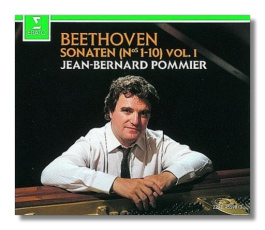
Vol. 1, Sonatas 1-10: 3 CDs, Erato 2292-45598-2 (1991)
Vol. 2, Sonatas 11-20: 3 CDs, Erato 2292-45812-2 (1992)
Vol. 3, Sonatas 21-27: 3 CDs, Erato 4509-91727-2 (1994)
Vol. 4, Sonatas 28-32: 2 CDs, Erato 3984-23422-2 (1998)
- Jenő Jandó
-
Piano: unspecified
Vol. 1, Sonatas 8, 14, 23: Naxos 8.550045 (1988)
Vol. 2, Sonatas 17, 21, 26: Naxos 8.550054 (1991)
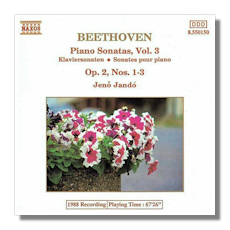
Vol. 3, Sonatas 1-3: Naxos 8.550150 (1991)
Vol. 4, Sonatas 30-32: Naxos 8.550151 (1988)
Vol. 5, Sonatas 5-7, 25: Naxos 8.550161 (1988)
Vol. 6, Sonatas 9, 10, 24, 27, 28: Naxos 8.550162 (1988)
Vol. 7, Sonatas 12, 16, 18: Naxos 8.550166 (1988)
Vol. 8, Sonatas 4, 13, 19, 20, 22: Naxos 8.550167 (1988)
Vol. 9, Sonatas 11, 29: Naxos 8.550234 (1989)
Vol. 10, Sonatas 15; WoO 47/1-3, Anh. 5 Nos. 1-2, WoO 51: Naxos 8.550255 (1989)
or
Box Set Vol. 1, Sonatas 1-3, 5-8, 11, 12, 14, 16, 18, 23, 25-27, 29: Naxos 8.505002 (1994)
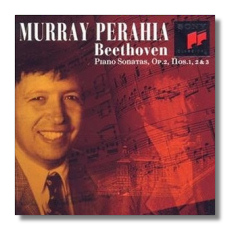
- Murray Perahia
-
Piano: unspecified
Sonatas 1-3
Sony Classical SK64397 (1995)
- Louis Lortie
-
Piano: unspecified
Sonatas 4, 9, 10
Sonata for Piano Four Hands, Opus 6 (performed with Helene Mercier)
Chandos CHAN9347 (1995)
- Ivan Moravec
-
Piano: unspecified
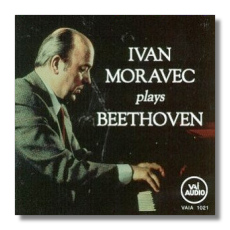
Vol. 1: Piano Concerto No. 4, with Martin Turnovsky conducting The Orchestra of the Vienna Musikverein;
Sonata 27; 32 Variations in C Minor, WoO 80
VAI Audio VAIA1021 (1963, 1966, 1992)
Vol. 2: Sonatas 8, 14, 23, 26
VAI Audio VAIA1069 (1962-1970, 1994)
- Ursula Oppens
-
Piano: Steinway Model D Concert Grand Piano #499072
Fantasia in G Minor/B Major, Opus 77; Sonatas 11, 29
Music & Arts CD-734 (1992)
- Charles Rosen
-
Piano: unspecified
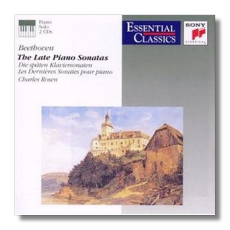
Sonatas 27-32
2 CDs, Sony Essential Classics SB2K53531 (1971, 1994)
Period Pianos
- Ronald Brautigam
-
Fortepiano: Paul McNulty, Amsterdam 1992, after Anton Walter, Vienna 1795
Early Piano Variations, WoO 66, 68-73, 75: Globe GLO5095 (1993)
Sonatas 1-3, 19, 20: Globe GLO5100 (1994)
- Alexei Lubimov
-
Pianoforte: John Broadwood & Son, 1806
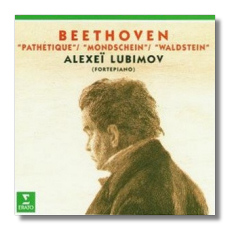
Sonatas 8, 14, 21
Erato 4509-94356-2 (1994)
- Paul Badura-Skoda
-
Pianoforte: Caspar Schmidt, Prague c. 1810
Vol. 5: Sonatas 15-17
Astree E8695 (1988)
- Paul Badura-Skoda
-
Pianoforte: Georg Haska, Vienna c. 1815
Vol. 6: Sonatas 18, 24-27
Astree E8696 (1989)
- Paul Komen
-
Pianoforte: Conrad Graf, Vienna c. 1830
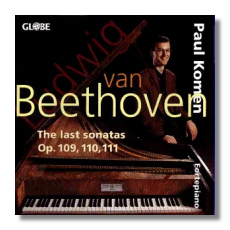
Vol. 1: Sonatas 30-32
Globe GLO5106 (1993)
- Paul Komen
-
Pianoforte: Johann Fritz, Vienna 1825
Vol. 2: Sonatas 21-23
Globe GLO5118 (1994)
- Paul Komen
-
Pianoforte: Salvatore la Grassa, Viennese school c. 1815
Vol. 3: Sonatas 16-18
Globe GLO5136 (1995)
Copyright © 1996, Ron Drummond.













